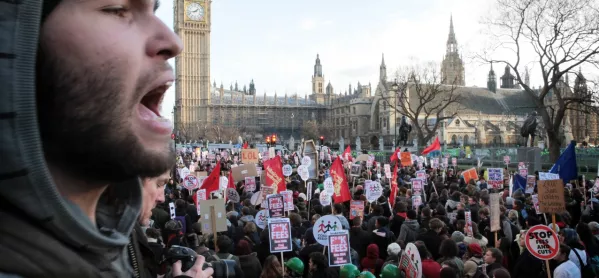- Home
- If RE is compulsory in school, surely politics should be too. Why isn’t it?
If RE is compulsory in school, surely politics should be too. Why isn’t it?

Before the 2015 election, I attended an event organised by VInspired, a campaign group set up to engaged young people with politics. Two graffiti artists had been hired to engage in an ‘art battle’.
A volunteer circled the crowd of 18-25 year-olds with a microphone, encouraging them to shout out policies which would encourage them to vote. The street artists were then tasked with drawing whatever they heard, the idea being that they were creating a composite image depicting the assembled young people’s vision of a better society.
The ideas the artists were tasked with illustrating included more funding for the NHS, cheaper public transport, reduced student fees and better mental health education in schools.
Not voting only works alongside anarchy
The irony was that pretty much every person I spoke to at that event was convinced that none of the existing parties were offering them what they wanted, despite what they had listed being (predominantly Labour and Liberal Democrat) actual campaign pledges.
It struck me that this was symbolic of a generation perceived to be politically apathetic but who, as anyone who works with them will tell you, are in fact incredibly passionate about social change.
Of course, there are those who would maintain that the way to bring about a better Britain is to abstain from voting altogether (Russell Brand I’m looking at you), but the problem is that not voting really only works within the context of more widespread anarchy.
Until there is a box on your ballot paper which says “I have made the effort to come here and my vote is up for grabs, but none of you f***rs are worth it”, a non-vote is an exercise in silencing and disempowering yourself.
Unfortunately, unless you have chosen to study it (and sometimes even if you have), politics is an ideological minefield. It’s virtually impossible for your average person to penetrate the platitudes and jargon, decipher the ‘fake news’ and make an informed decision.
The wisdom of the political classes is often that we are too stupid or uninterested to be trusted with the details and so tribal politics, which deals in broad, meaningless brushstrokes, prevails.
‘You can trust a teacher to withhold their political biases’
With another general election around the corner, it seems to me perfectly sensible that politics should be a compulsory subject in school. After all, religious education is part of the curriculum up until Year 9 and understanding political theory is just as essential to understanding the world and the motivations of the people we interact with.
Whenever I have had conversations about this either with politicians or people who don’t work in education (I do know a couple) I’m told that the teaching profession have a reputation for a propensity towards socialism and the fear is they will unjustly influence their young charges towards a vote for Corbyn *or insert your favourite left wing figurehead here*.
My answer is always the same: if you can trust a Christian RE teacher to have enough objectivity to teach children the rudiments of Islam then you can trust a teacher to keep their political biases out of the classroom, too.
Going full on, tinfoil-hat wearing conspiracy theorist for a second, I’m tempted to believe that politics is deliberately excluded from education, since if we better understood the system we’d also have a better understanding of the incompetence of the vast majority of politicians.
If the general population are kept largely ignorant of the inner workings of Westminster, they’re much easier to lie to and manipulate.
Critical thinking is a muscle we are encouraged to flex during our school years, so why is it that so many school leavers now claim not to have understood what they were voting for, during the recent Brexit referendum? It’s because of the vast chasm, the us-and-them that has developed between the so-called ‘political classes’ and the rest of us.
That’s a current no-man’s land which could be explored, at least tentatively, in the classroom.
Six million 18-25 year-olds were eligible to vote in the last general election but did not. At a time when no party is capable of winning a convincing majority, they have the power to bring about dramatic change, if only someone had taught them how to use it.
It’s time to let go of the antiquated notion that politics doesn’t belong in the classroom. If we do not, we condemn young people to more of the same: a future where their needs are not acknowledged or met because it is known that their vote is not there to be won.
Natasha Devon is founder of the Body Gossip Education Programme and the Self-Esteem Team and former UK government mental health champion for schools. She tweets as @_NatashaDevon
For more columns by Natasha, visit her back catalogue of articles
Want to keep up with the latest education news and opinion? Follow Tes on Twitter and like Tes on Facebook
Keep reading for just £1 per month
You've reached your limit of free articles this month. Subscribe for £1 per month for three months and get:
- Unlimited access to all Tes magazine content
- Exclusive subscriber-only stories
- Award-winning email newsletters


